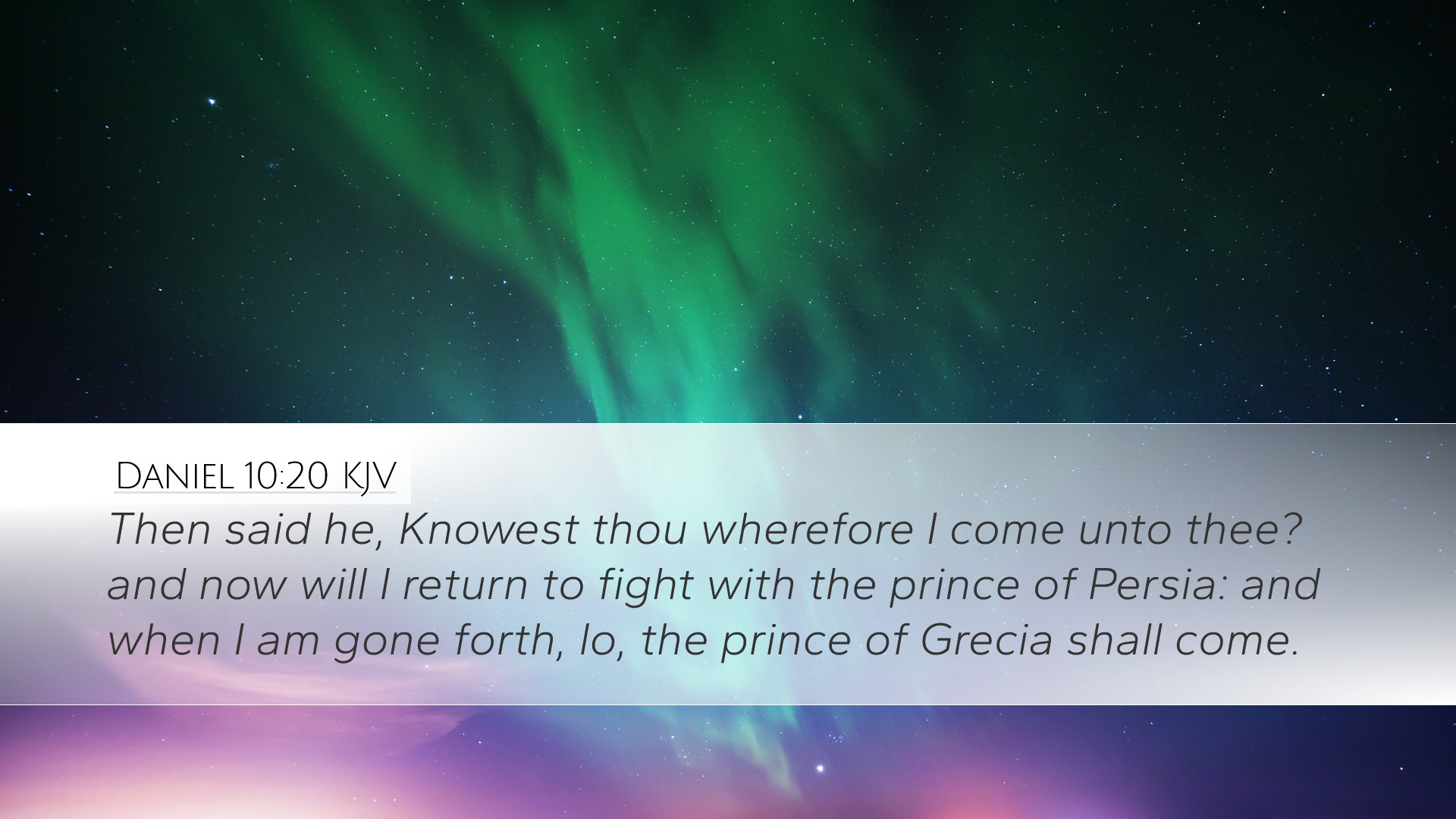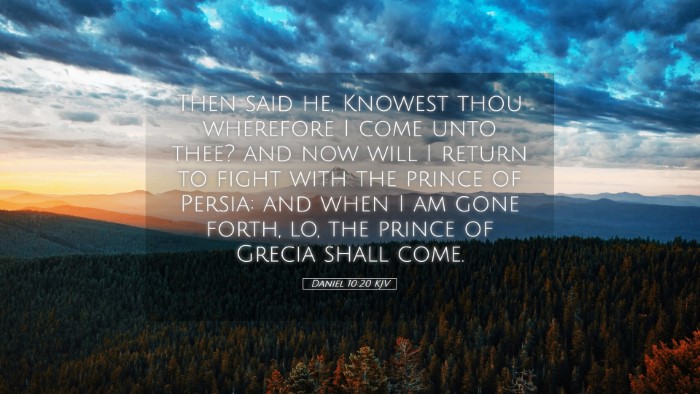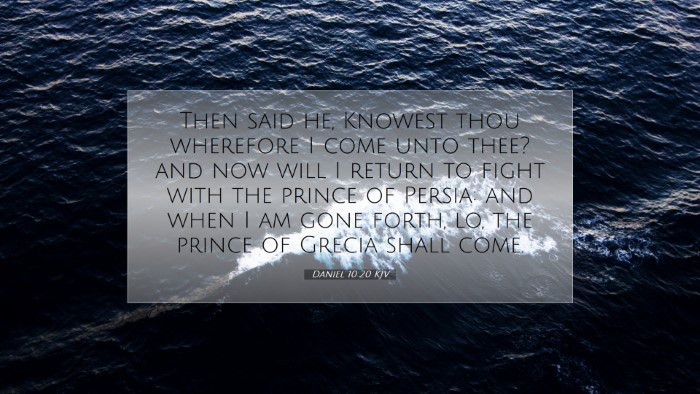Old Testament
Genesis Exodus Leviticus Numbers Deuteronomy Joshua Judges Ruth 1 Samuel 2 Samuel 1 Kings 2 Kings 1 Chronicles 2 Chronicles Ezra Nehemiah Esther Job Psalms Proverbs Ecclesiastes Song of Solomon Isaiah Jeremiah Lamentations Ezekiel Daniel Hosea Joel Amos Obadiah Jonah Micah Nahum Habakkuk Zephaniah Haggai Zechariah MalachiDaniel 10:20
Daniel 10:20 KJV
Then said he, Knowest thou wherefore I come unto thee? and now will I return to fight with the prince of Persia: and when I am gone forth, lo, the prince of Grecia shall come.
Daniel 10:20 Bible Commentary
Commentary on Daniel 10:20
Bible Verse: Daniel 10:20 - "Then said he, Knowest thou wherefore I come unto thee? and now will I return to fight with the prince of Persia: and when I am gone forth, lo, the prince of Greece shall come."
Introduction
The book of Daniel, situated within the context of exile, reveals profound theological insights regarding God's sovereignty over the nations, the spiritual warfare behind historical events, and the encouragement it provides to believers. Daniel 10:20, in particular, invites a deep exploration of angelic beings, spiritual warfare, and the divine plans that govern earthly kingdoms.
Contextual Background
This verse appears in a passage where Daniel has been mourning and praying for insight regarding the fate of his people. He receives a visit from a divine messenger, and this encounter illustrates the rich interplay between heaven and earth, and the conflict among spiritual forces.
Importance of the Vision
The preceding and subsequent verses frame this encounter as crucial for understanding the prophetic messages Daniel was about to receive. A protracted delay in the angel's arrival (10:13) signifies the intense opposition faced by divine messengers, emphasizing the active role of spiritual warfare.
Commentary Insights
Matthew Henry's Commentary
Matthew Henry emphasizes that the angels and the forces of evil are engaged in constant warfare over the affairs of men. The "prince of Persia" and "the prince of Greece" represent significant spiritual forces influencing empires. Henry suggests that through this passage, believers are reminded of the unseen battles that take place around them, urging them to be steadfast in prayer and faith.
Albert Barnes' Notes on the Bible
Albert Barnes elaborates on the phrase "knowest thou wherefore I come unto thee?" indicating that there is a purpose behind every divine visitation. Barnes explains that the purpose of this specific message was to reveal an impending change in the geographic and political landscape, from Persia to Greece. This transition would have significant implications for Israel and their understanding of God's plans for redemption.
Adam Clarke's Commentary
Adam Clarke provides a detailed analysis of the "prince of Persia" and "prince of Greece," underscoring their symbolic representation of spiritual rulers over earthly kingdoms. Clarke connects these figures to the broader theme of God’s sovereignty over nations and reassures believers that God is ultimately in control, regardless of the tumultuous political environment.
Theological Implications
This passage serves multiple theological implications worth exploring:
- Spiritual Warfare: The dichotomy represented by the princes reflects the reality of spiritual conflict and the necessity for believers to engage in prayer as a means of accessing divine assistance.
- Divine Providence: The narrative underscores God's active involvement in history. The movement from Persia to Greece illustrates that God orchestrates events for the fulfillment of His purposes.
- Encouragement for Believers: For those in ministry or facing difficulty, the passage offers profound encouragement: God is aware of the struggles and is working behind the scenes to fulfill His promises.
Application for Pastors and Theologians
The insights garnered from Daniel 10:20 provide several applications:
- Expository Preaching: Pastors can use this text to emphasize the importance of recognizing spiritual realities that undergird human experiences, thus fostering a deeper understanding of scripture among congregants.
- Prayer Life: The narrative prompts an evaluation of personal and corporate prayer life. Emphasizing prayer as a tool for engagement in spiritual warfare can reignite a congregation's commitment to intercession.
- Understanding History: The history of nations, as interpreted through this verse, invites scholars to explore how biblical prophecy intersects with historical events, enriching the understanding of God’s unfolding story in the world.
Conclusion
Daniel 10:20 serves as a poignant reminder of the unseen battles that shape the visible world. Engaging with the insights of Henry, Barnes, and Clarke unveils the verse's rich layers of meaning, providing pastoral and scholarly communities with tools for deeper study, impactful preaching, and vibrant faith in the face of both spiritual and worldly challenges.


